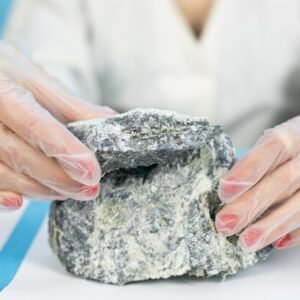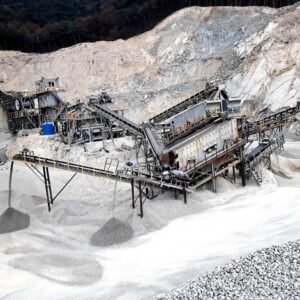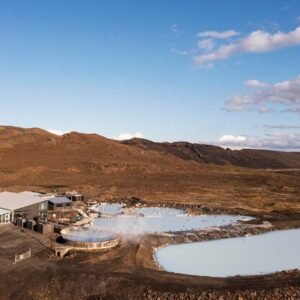Introduction
Bentonite, including OCMA (Oil Companies Materials Association) and API (American Petroleum Institute) grade bentonite, serves as a multi-purpose clay mineral essential to sectors like oil & gas production, construction work, foundry operations, and environmental engineering projects. CMS Industries focuses on delivering high-quality bentonite powder that complies with API-grade specifications and stringent industry standards.
This comprehensive guide will examine the essential properties of OCMA bentonite suppliers along with its specifications and applications, and advantages across multiple fields. If you work in drilling, construction, or wastewater treatment, you need to know these properties to select the best bentonite for your requirements.
What is OCMA & API Bentonite?
Definition & Formation
Bentonite is a naturally occurring absorbent aluminum phyllosilicate clay, primarily composed of montmorillonite. It is formed from volcanic ash sedimentation and is known for its swelling, viscosity, and binding properties.
- OCMA Bentonite: Complies with the Oil Companies Materials Association standards, primarily used in drilling fluid applications.
- API Bentonite: Meets the American Petroleum Institute (API) standards (API 13A Section 9) and is widely used in oil well drilling, civil engineering, and environmental sealing.
Why Choose API/OCMA Grade Bentonite?
- High swelling capacity (up to 10-12 times its dry volume)
- Excellent viscosity and gel strength for superior suspension properties
- Low sand content for better fluid loss control
- Thermal stability in high-temperature drilling conditions
Key Properties of OCMA & API Bentonite
1. High Swelling Capacity
One of the most critical properties of OCMA bentonite is its ability to absorb water and swell, forming a gel-like structure. This property is essential for:
- Drilling muds: Prevents borehole collapse by creating a protective layer.
- Landfill liners: Ensure impermeability to prevent leachate seepage.
2. Viscosity & Rheological Properties
API-grade bentonite provides optimal viscosity, which helps in:
- Suspending drill cuttings for easy removal.
- Reducing friction between the drill string and wellbore.
3. Filtration Control (Fluid Loss Property)
Bentonite forms a low-permeability filter cake, minimizing fluid loss into formations. This is measured by:
- API Fluid Loss Test (max 15 ml/30 min for API-grade bentonite).
4. Thermal & Chemical Stability
- Resists high temperatures (up to 150°C) without losing viscosity.
- Chemically inert, making it suitable for harsh drilling environments.
5. Low Sand Content
API specifications require less than 2.5% sand content, ensuring:
- Smooth drilling operations without abrasion.
- Longer equipment lifespan.
6. Yield Point & Gel Strength
- Yield Point (YP): Indicates the ability to lift cuttings (optimal range: 10-30 lb/100 ft²).
- Gel Strength: Ensures suspension of solids when circulation stops.
API Bentonite Specifications (As per API 13A)
| Property | API 13A Standard Requirement | OCMA Standard |
| Moisture Content (%) | ≤ 13% | ≤ 15% |
| pH Value | 9.5 – 10.5 | 9 – 11 |
| Fluid Loss (ml/30 min) | ≤ 15 ml | ≤ 16 ml |
| Sand Content (%) | ≤ 2.5% | ≤ 2.5% |
| Yield (bbl/ton) | ≥ 85 | ≥ 75 |
| Gel Strength (10 sec/10 min) | 5 – 15 lb/100 ft² | 4 – 12 lb/100 ft² |
Uses of API Bentonite in Various Industries
1. Oil & Gas Drilling (Primary Use)
- Drilling Fluids: Forms a stable mud to cool, lubricate, and remove cuttings.
- Wellbore Stabilization: Prevents collapse and fluid invasion.
2. Civil Engineering & Construction
- Slurry Walls: Acts as a barrier in tunneling and excavation.
- Foundation Stabilization: Enhances soil strength in construction.
3. Foundry & Metal Casting
- Binder in Molding Sands: Improves green strength of molds.
4. Environmental Applications
- Landfill Liners: Prevents toxic leachate leakage.
- Wastewater Treatment: Adsorbs heavy metals & impurities.
5. Agriculture & Animal Feed
- Feed Binder: Prevents caking in animal feed.
- Soil Conditioner: Improves water retention in arid soils.
OCMA Bentonite Production Process: From Mining to Final Product
OCMA-grade bentonite is produced through a series of precisely regulated steps that guarantee compliance with Oil Companies Materials Association (OCMA) and API 13A specifications. CMS Industries employs a structured process to produce superior bentonite powder, which meets the needs of drilling fluids as well as construction and industrial uses.
This section provides a thorough explanation of the OCMA bentonite production process:
1. Mining & Raw Material Selection
The process begins with mining high-quality sodium bentonite from natural deposits. The selection of raw material is crucial because:
- Sodium-based bentonite has superior swelling and viscosity properties compared to calcium bentonite.
- The mined clay must have low impurities (sand, gravel, and organic matter) to meet OCMA specifications.
Mining is typically done via open-pit methods, where bentonite is extracted in large chunks and transported to processing plants.
2. Crushing & Drying
The raw bentonite is then subjected to:
- Primary crushing: Large chunks are broken down into smaller pieces (2-5 inches).
- Secondary crushing: Further reduced to <1-inch particles for efficient drying.
- Natural or forced drying: Excess moisture is removed to bring the moisture content below 15% (as per OCMA standards).
Drying can be done using:
- Sun drying (in dry climates)
- Rotary dryers (for faster, controlled drying)
3. Milling & Grinding
The dried bentonite is then finely ground into a powder using:
- Raymond mills (for coarse grinding)
- Ball mills or jet mills (for ultra-fine particles)
The goal is to achieve a uniform particle size (90% passing 200 mesh/75 microns) to ensure:
- Better hydration when mixed with water
- Improved viscosity and gel strength in drilling fluids
4. Purification & Quality Control
To meet OCMA/API standards, the bentonite undergoes:
- Air classification: Removes oversized particles.
- Magnetic separation: Eliminates iron impurities.
- Sieving: Ensures consistent particle size distribution.
Samples are tested for:
- Fluid loss (must be ≤ 16 ml/30 min for OCMA)
- Yield point (≥ 75 bbl/ton)
- Gel strength (4-12 lb/100 ft²)
- Sand content (≤ 2.5%)
5. Activation (If Required)
Some calcium bentonite deposits are sodium-activated to enhance swelling properties. This involves:
- Mixing with sodium carbonate (soda ash)
- Aging for 24-48 hours to allow ion exchange
- Re-drying & milling to achieve the desired properties
6. Packaging & Storage
The final OCMA-grade bentonite powder is:
- Packed in 25/50 kg HDPE bags or bulk shipments
- Stored in moisture-proof warehouses to prevent clumping
- Transported under controlled conditions to maintain quality
Why Choose CMS Industries for API Bentonite?
At CMS Industries, we provide premium-grade API bentonite powder that complies with API 13A, OCMA, and ISO standards. Our bentonite offers:
- High yield & viscosity for efficient drilling
- Low fluid loss for better filtration control
- Strict quality checks for consistency
Conclusion
Industries that need superior drilling fluids, along with soil stabilization and environmental protection, cannot function without API and OCMA bentonite. A clear grasp of their essential properties and specifications allows for selecting the best products for your project’s needs.
CMS Industries provides superior API-grade bentonite powder that complies with global industry standards. Reach out to us now to get premium bentonite solutions customized for your requirements.
Frequently Asked Questions
Q1: What is the difference between OCMA and API bentonite?
OCMA bentonite follows Oil Companies Materials Association standards, while API bentonite meets API 13A specifications. API-grade is more stringent in fluid loss and yield requirements.
Q2: Can API bentonite be used in construction?
Yes! It is widely used in slurry walls, tunneling, and foundation stabilization due to its swelling and sealing properties.
Q3: What is the shelf life of bentonite powder?
When stored in a dry, cool place, bentonite powder remains effective for up to 2 years.
Q4: How is API bentonite tested for quality?
It undergoes API fluid loss test, viscosity test, sand content analysis, and yield point measurement in certified labs.







